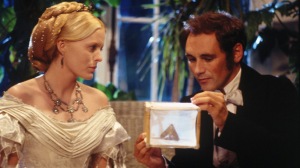We’ve been talking recently about the Victorian Studies Association of Western Canada’s 2013 conference in Vancouver a few weeks back, so I thought I would add a few of my own thoughts. The conference was a truly fantastic and welcoming weekend of Victorian studies on the topic of Victorian humanity and its others. I learned a lot, and had a great time connecting with some good friends and colleagues.
From a personal perspective, though, one paper in particular really made me think about what it is that we do in Victorian studies, and why our field has embraced wholeheartedly a cultural and print studies turn in literary criticism. At the risk of sounding kind of self-promotional, that paper was by my wife, Allison Fieldberg, who read some new work on silence and the ethics of the novel genre in the Brontes. Strangely, despite the fact that we’re both Victorianists and spend probably far too much of our time together talking about Victorian literature and literary and cultural criticism, we don’t often get a chance to share our ideas with each other, especially as they appear in our formal writing. Continue reading “Melancholia and the Digitization of Victorian Culture” →




